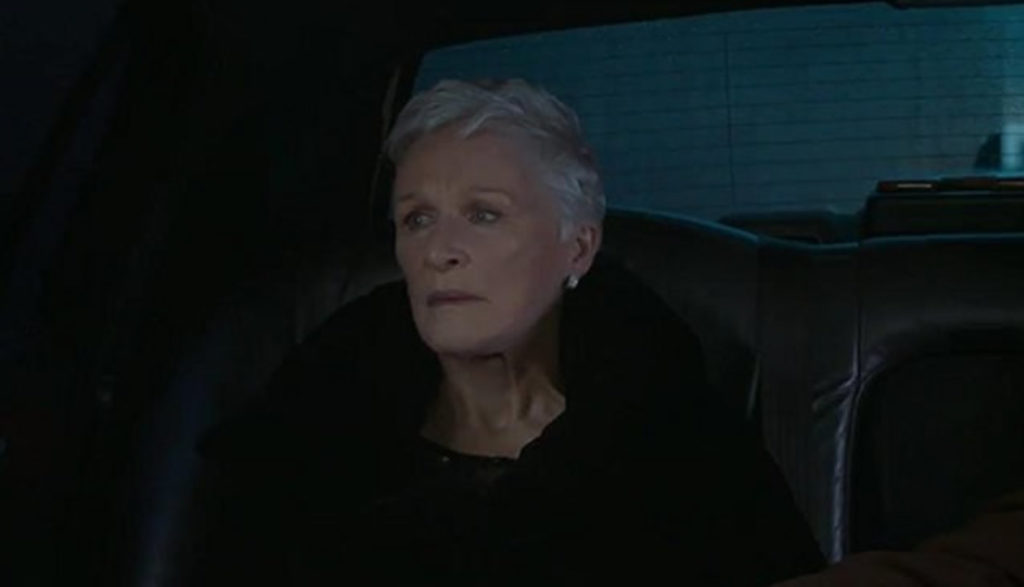
To be in the shadows: For some, this is a blessing, keeping an arm’s length from the limelight. For others, it’s a curse. Sometimes it’s both.
And so it is with Joan Castleman.
Joan is the ideal wife. Sweet and attentive, she always puts others before herself. She’s been married to the same man, Joe Castleman, for more than 30 years. Each of those long years, Joan has sacrificed her own talent and ambition to support his soaring literary ambitions.
But the same certainly can’t be said for Mr. Castleman. Once a young professor known for wooing his female students with the written word, Joe has built his life upon seduction and lies—in more ways than one.
One morning, Joe and Joan receive a call from Stockholm: Joe has just been awarded the Nobel Prize in Literature for his brilliant career as a novelist. Now, he and Joan, along with their young adult son, Max, must travel to Stockholm to receive the honor in person (along with Nobel winners in other disciplines).
But once the festivities and accolades commence in Sweden, Joan slowly realizes she can no longer flee from her past decisions, her deepest passions and the true reality of the shallow man for whom she has sacrificed her entire life.
Joan Castleman makes plenty of mistakes; but she’s always aware of other people and their needs. Joan continually puts the priorities and desires of her children and husband before herself (even though her husband takes her for granted). When Joe refuses to encourage his son, David, in his fledgling writing career, Joan gives sage advice, offering kind words of affirmation. Joan is sweet, supportive, calming and attentive. She steps back and allows her husband to take the spotlight for the things that she herself has accomplished.
A handful of other people see things for what they are, especially a somewhat prying journalist named Nathaniel Bone. Though he may have ulterior motives, Nathaniel recognizes Joan’s contribution to her husband’s success. Whereas her husband can never seem to give credit to anyone other than himself, Nathaniel suspects that there’s more to the story than anyone knows. He also truly sees Joan and helps her to realize that she, too, deserves to be recognized as an individual—not as someone’s identity-less shadow.
[Spoiler Warning] After decades of passively submitting to Joe’s deep character flaws, Joan eventually confronts her husband about the core deception that runs through their entire marriage.
We hear talk of forgiveness for a long-ago affair that ended someone’s marriage.
We gradually learn that Joe’s impulsivity, narcissism and lack of self-control have contributed to many affairs with other women over the course of his marriage to Joan, something she’s apparently aware of in a general sense. While they’re in Sweden, Joe very nearly has another affair with a young photographer who’s been assigned to take pictures of him during the festivities. Joe’s marital infidelities are chalked up to an “overactive libido.”
Flashbacks tell the story of Joe wooing Joan, despite the fact that he’s married and has a child. That affair eventually leads to Joe divorcing his first wife, after which he marries Joan. (During their affair, young Joan finds “spermicidal jelly” in his dresser.)
Joe and Joan engage in brief foreplay before having sex in bed. Nothing is visible, but we see some movements and hear intimate sounds.
Elsewhere, Joe graphically describes a sexual act, which includes a reference to his own genitalia. He makes other crude sexual comments, too, with some of them referring to his son (“I hope he gets laid”). A younger man playfully flirts with a much older Joan.
An ancient Greek statue of a man and babies (both partially nude) is seen in the background. Women wear revealing tops. Multiple couples kiss.
Joe and Joan have semi-violent outbursts. (Each of them throws things and shouts in anger.) David pushes his father up against a wall. One person has a life-threatening medical emergency.
The f-word is heard nearly 40 times and the s-word about 10. Both God’s and Jesus’ names are misused about 10 times each as well, with God’s name occasionally paired with “d–n.” Other profanities include multiple uses of “h—,” “b–tard” and “d–n.” David calls his father a “pr–k.”
Joe offers champagne to his pregnant daughter. Men and women smoke cigarettes and consume hard liquor, beer, wine and champagne at parties, bars and other locations. A young man offers a box of cigars as a gift. Joe accuses his son of “smoking pot.”
Joe and David endure a deeply broken relationship. David feels that his father is ashamed of him and thinks of him as a second-rate writer. Joe frequently calls his son an “idiot,” publicly shaming him.
As already mentioned, Joe is a narcissist to his core. Not only does he believe himself to be the only individual worthy of praise, but he also makes others feel as if their work and talent could never match his own. He often tears others down and is generally impatient, impulsive and arrogant
Many times Joan does not stand up for herself or speak out when she should. Years of being taken advantage of have left her with pent-up anger and bitterness.
Various flashbacks show young Joan trying to compete in the literary world, until she is told by a female author that her books will never be read in “the world of men.” Joan recognizes this to be true when she works at a publishing company and sees men pass up the stories written by women, deeming them too “emotional.”
In our Western culture, we often struggle with the concept of putting others before ourselves. At least, I know that I do. But when is time to draw the line? When do you draw a boundary line to protect your heart and your value when you’re being emotionally abused?
The Wife offers a beautiful, complex, chaotic portrayal of a married couple whose relationship is haunted by a dark secret. It zooms in on the quiet, simmering pain of a woman who has been shunted into the background by her husband and by sexist, chauvinistic culture for her entire adult life. It reveals the deep insecurities of a man living only for himself who somehow seems to believe the lie he’s lived for so long. And the movie shows, achingly, how much children long for their parents’ love and affirmation—and the destruction that occurs when they don’t receive it.
This movie was sobering. It gave me much to think about— how I would (and would not) like my marriage to look 40 years from now. It’s real and raw and exquisite.
It’s also a mess. That messiness contributes to the film’s sense of authenticity as it portrays this deeply dysfunctional couple’s relationship, of course. But harsh profanity and some sexual content means that this penetrating portrait of a badly broken marriage—and the longsuffering wife at the center of it—isn’t for everyone.

Kristin Smith joined the Plugged In team in 2017. Formerly a Spanish and English teacher, Kristin loves reading literature and eating authentic Mexican tacos. She and her husband, Eddy, love raising their children Judah and Selah. Kristin also has a deep affection for coffee, music, her dog (Cali) and cat (Aslan).